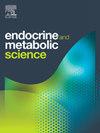急性和长期酮病会降低人体血清 IGF-I 水平
Q3 Medicine
引用次数: 0
摘要
目的代谢健康和长寿受多种因素的影响,包括生长激素(GH)-胰岛素样生长因子 I(IGFI)轴和酮体(KB)。设计和患者研究急性和慢性 KB 暴露对人体 GH 和 IGF-I 水平的影响。在三项人体研究中测量了 GH 和 IGF-I 水平:i) 六名健康人单次口服 KB(36.5 克 Na-D/L-βOHB )与安慰剂后;ii) 六名健康人单次口服 KB(36.5 克 Na-D/L-βOHB )与安慰剂后。安慰剂;ii) 在 11 名超重者中进行为期三周的等热量生酮饮食 (KD) 与标准饮食 (SD) 的比较;iii) 在一项遗传易感性研究中使用与酮尿症有关的 SCOT 基因的特定遗传变异(rs7712274 和 rs7728482)。结果 单次口服 KB 能显著降低血清 IGF-I,33 纳克/毫升(KB 摄入)与 15 纳克/毫升(安慰剂)之比,P = 0.01。生酮饮食可明显降低血清 IGF-I 水平,为 111 纳克/毫升(KD)对 125 纳克/毫升(SD),P = 0.01,同时血清 GH 为 0.9 纳克/毫升对 1.8 纳克/毫升(KD)对 0.9 纳克/毫升对 0.4 纳克/毫升(SD),P = 0.03。有酮尿遗传倾向的个体 IGF-I 水平较低(β = -0.0068,SE = 0.0029,P = 0.02)。这一观察结果表明,KB 对肝脏 IGF-I 的产生有抑制作用。酮尿遗传易感性与体型增大之间的关联出乎意料,值得进一步研究。本文章由计算机程序翻译,如有差异,请以英文原文为准。
Acute and prolonged ketosis lower serum IGF-I levels in human subjects
Objective
Metabolic health and longevity are influenced by numerous factors including the growth hormone (GH) – insulin-like growth factor I (IGF![]() I) axis and ketone bodies (KB). However, data on the impact of KB exposure on GH and IGF-I levels are few.
I) axis and ketone bodies (KB). However, data on the impact of KB exposure on GH and IGF-I levels are few.
Design and patients
To investigate the effect of acute and chronic KB exposure on GH and IGF-I levels in human subjects. GH and IGF-I levels were measured in three human studies: i) After a single oral ingestion of KB (36.5 g of Na-D/L-βOHB) vs. placebo in six healthy individuals; ii): after a three-week isocaloric ketogenic diet (KD) compared to a standard diet (SD) in 11 overweight individuals; and iii) in a genetic predisposition study using the specific genetic variants in the SCOT gene (rs7712274 and rs7728482), which is associated with ketonuria.
Results
A single oral KB ingestion significantly lowered serum IGF-I with 33 ng/ml (KB ingestion) vs 15 ng/ml (placebo), P = 0.01. Ketogenic diet significantly lowered serum IGF-I levels 111 ng/ml (KD) vs 125 ng/ml (SD), P = 0.01 in combination with a two-fold increase in serum GH 0.9 ng/ml to 1.8 ng/ml (KD) compared to 0.9 ng/ml to 0.4 ng/ml (SD), P = 0.03. Individuals with genetic predisposition to ketonuria had lower levels of IGF-I (β = −0.0068, SE = 0.0029, P = 0.02).
Conclusions
KB exposure is associated with reduced serum IGF-I levels in the presence of non-suppressed or elevated GH levels. This observation points to a suppressive effect of KB on hepatic IGF-I production. The association between genetic predisposition to ketonuria and increased body size is unexpected and deserves further investigations.
求助全文
通过发布文献求助,成功后即可免费获取论文全文。
去求助
来源期刊

Endocrine and Metabolic Science
Medicine-Endocrinology, Diabetes and Metabolism
CiteScore
2.80
自引率
0.00%
发文量
4
审稿时长
84 days
 求助内容:
求助内容: 应助结果提醒方式:
应助结果提醒方式:


